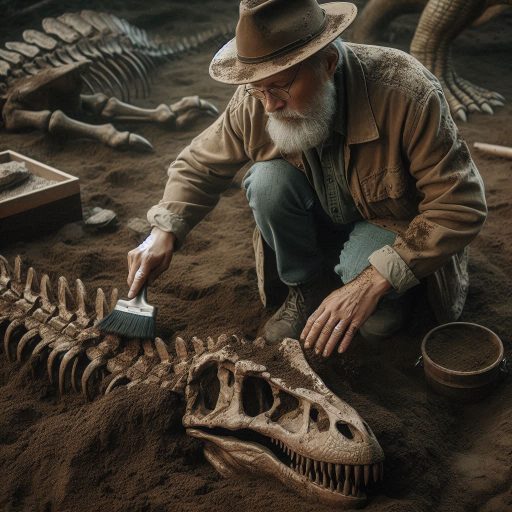Introduction
Toxicologists are scientists who study the effects of chemicals and substances on living organisms and the environment.
They play a vital role in environmental protection by assessing the risks posed by pollutants and hazardous materials.
By understanding how these substances interact with ecosystems, toxicologists help develop strategies to mitigate their impact.
Toxicologists identify and evaluate environmental hazards, such as toxic chemicals and heavy metals, that can harm wildlife and humans.
They conduct research to determine the toxicity levels of various substances, including pesticides, industrial chemicals, and waste products.
This research informs regulatory agencies and policymakers, guiding decisions on environmental safety.
Furthermore, toxicologists assess the long-term effects of chemical exposure on ecosystems.
They monitor contaminated sites and study the bioaccumulation of toxins in plants and animals.
This information is crucial for developing cleanup strategies and ensuring the health of ecosystems.
The expertise of toxicologists is also vital during environmental assessments for new projects.
Their evaluations help industries comply with environmental regulations and minimize their ecological footprint.
Overall, toxicologists significantly contribute to environmental protection efforts by identifying hazards, assessing risks, and providing solutions to safeguard public health and preserve ecosystems.
Assessing environmental risks
Toxicologists Analyze Potential Risks Posed by Various Environmental Factors
Toxicologists play a vital role in environmental protection.
They analyze potential risks from various environmental factors.
Pollution, chemicals, and waste pose significant threats to public health and ecosystems.
Toxicologists assess these risks to identify harmful substances and their effects.
Their work begins with collecting samples from contaminated sites.
These samples can include air, water, soil, and biological tissues.
Toxicologists test these samples for hazardous substances, such as heavy metals, pesticides, and industrial chemicals.
They use advanced analytical techniques to detect and quantify these toxins accurately.
Once they identify potential hazards, toxicologists evaluate their sources.
This evaluation helps determine how pollutants enter the environment.
Understanding the pathways of exposure is crucial for risk assessment.
Toxicologists also investigate how long these substances persist in the environment.
They consider factors such as degradation rates and bioaccumulation.
Toxicologists collaborate with environmental scientists to develop strategies for pollution prevention.
They provide expert advice on regulatory compliance and safe practices.
By identifying harmful practices, they help industries reduce their environmental footprint.
Their insights guide companies in adopting safer alternatives and minimizing waste.
Moreover, toxicologists contribute to public awareness campaigns.
They educate communities about the risks associated with pollutants and hazardous waste.
By raising awareness, they empower individuals to make informed decisions about their environment.
This proactive approach encourages communities to advocate for cleaner and safer environments.
Conducting Thorough Evaluations to Determine the Impact of Hazards
Toxicologists conduct thorough evaluations to assess the impact of environmental hazards.
They study the effects of pollutants on human health and ecosystems.
This process involves both laboratory and field studies.
In laboratory settings, toxicologists perform controlled experiments to understand toxic effects.
They expose organisms, such as fish or rodents, to specific substances.
By observing physiological and behavioral changes, they assess the toxicological effects of exposure.
These experiments provide critical data on dose-response relationships.
Field studies complement laboratory research.
Toxicologists investigate real-world scenarios to understand how pollutants affect communities.
They collect data on health outcomes, environmental conditions, and exposure levels.
This information helps establish connections between pollutants and health issues.
Toxicologists also perform risk assessments to quantify the potential impacts of exposure.
They evaluate both acute and chronic effects, considering vulnerable populations.
Special attention is given to children, the elderly, and those with pre-existing health conditions.
By identifying at-risk groups, toxicologists inform public health initiatives.
Their evaluations also consider the broader ecosystem.
Toxicologists assess how pollutants impact wildlife, plants, and ecosystems.
They analyze changes in species diversity, habitat health, and food webs.
This information helps guide environmental management and conservation efforts.
Toxicologists work with policymakers to develop regulations.
They provide scientific evidence to support legislation aimed at reducing environmental hazards.
Their expertise informs guidelines for permissible levels of exposure to toxic substances.
This collaboration ensures that public health and environmental protection are prioritized.
Toxicologists significantly contribute to environmental protection.
They analyze risks from pollution, chemicals, and waste while conducting thorough evaluations.
By assessing the impacts of these hazards, toxicologists help protect human health and ecosystems.
Their work supports sustainable practices and informs policy decisions that benefit society.
Developing Safety Regulations
Toxicologists‘ Role in Developing Safety Regulations
Toxicologists play a crucial role in creating safety regulations that protect the environment and public health.
They study the effects of chemicals and pollutants on ecosystems and human health.
This research informs policymakers about potential risks and necessary precautions.
By understanding the toxicity of various substances, toxicologists can recommend appropriate safety standards.
Regulatory agencies rely on toxicologists to develop guidelines for chemical usage.
These guidelines help prevent harmful exposures and promote safe practices.
Toxicologists assess the environmental impact of new chemicals before they enter the market.
Their evaluations determine whether substances are safe for public use and environmental sustainability.
In collaboration with government agencies, toxicologists help establish regulatory frameworks.
These frameworks govern the manufacture, distribution, and disposal of hazardous materials.
Their scientific expertise ensures that regulations are based on sound data and research.
This collaboration helps mitigate risks associated with chemical exposure.
Toxicologists also participate in risk assessment processes.
They evaluate the potential dangers posed by specific substances in various environments.
This assessment guides regulatory agencies in determining acceptable exposure limits.
By setting these limits, toxicologists protect both public health and the environment.
Furthermore, toxicologists contribute to the development of environmental policies.
They provide evidence-based recommendations to address environmental issues, such as pollution and climate change.
Their insights help shape laws and regulations that promote sustainability.
Toxicologists advocate for practices that minimize ecological harm while ensuring human safety.
Providing Scientific Expertise to Policymakers
Toxicologists serve as vital resources for policymakers and regulatory agencies.
Their scientific expertise allows them to translate complex data into understandable information.
Policymakers rely on toxicologists to provide evidence-based recommendations.
These recommendations guide decision-making and ensure public health is prioritized.
When crafting guidelines, toxicologists evaluate scientific literature and conduct research.
They analyze existing data on chemical toxicity and environmental impacts.
This rigorous analysis allows toxicologists to identify safe exposure levels and potential risks.
By providing comprehensive assessments, they help policymakers make informed decisions.
Toxicologists also participate in public health assessments.
They examine how environmental contaminants affect communities and ecosystems.
This assessment provides crucial information for developing targeted interventions.
By identifying at-risk populations, toxicologists help design effective public health strategies.
Moreover, toxicologists contribute to educational initiatives aimed at raising awareness.
They help communicate the importance of safety regulations and environmental protection.
By educating the public, toxicologists promote responsible practices and informed decision-making.
Collaboration with stakeholders is essential for effective policy development.
Toxicologists engage with industry representatives, environmental organizations, and community groups.
This collaboration ensures that diverse perspectives are considered in the decision-making process.
Toxicologists play a key role in developing safety regulations and standards.
Their scientific expertise supports policymakers and regulatory agencies in crafting effective guidelines.
By conducting rigorous research and engaging with stakeholders, toxicologists enhance environmental protection and public health.
Their contributions are vital for creating a safer and more sustainable world.
Read: Top Skills Needed for a Successful Geology Career
Monitoring environmental health
Toxicologists Monitor Environmental Health Indicators
Toxicologists play a crucial role in environmental protection.
They monitor environmental health indicators to track pollution levels and trends.
These indicators include air quality, water quality, and soil contamination.
By assessing these factors, toxicologists can identify areas needing urgent attention.
Toxicologists collect samples from various environmental sources.
They analyze these samples to determine the presence of harmful substances.
This analysis helps in understanding how pollutants impact ecosystems and human health.
Regular monitoring allows toxicologists to detect changes in pollution over time.
They also collaborate with environmental agencies to establish baseline data.
This data serves as a reference point for evaluating environmental health.
Toxicologists utilize this information to identify pollution sources and their effects.
Understanding these sources enables targeted interventions to mitigate environmental damage.
Furthermore, toxicologists assess the impact of industrial activities on local ecosystems.
They conduct studies to evaluate how these activities contribute to pollution.
This information is crucial for regulatory agencies when making policy decisions.
Toxicologists provide the scientific evidence needed to enforce environmental regulations.
By tracking environmental health indicators, toxicologists can identify emerging threats.
They stay vigilant about new pollutants and their potential effects.
This proactive approach is vital for safeguarding ecosystems and public health.
Using Data Analysis and Research to Identify Patterns
Toxicologists employ data analysis to identify patterns in environmental data.
They collect vast amounts of data from various sources, including monitoring stations and research studies.
Analyzing this data helps them understand the relationships between pollutants and health outcomes.
Statistical methods allow toxicologists to identify trends in pollution levels.
They assess how pollution levels change over time and across different regions.
This analysis helps pinpoint areas experiencing increased environmental stress.
Toxicologists also use geographic information systems (GIS) to visualize data.
GIS technology allows them to map pollution sources and affected areas.
These visual representations make it easier to communicate findings to stakeholders.
They help policymakers understand the urgency of addressing environmental issues.
Toxicologists conduct research to assess the effects of pollutants on ecosystems.
They study how contaminants impact flora and fauna, contributing to environmental degradation.
This research helps identify vulnerable species and ecosystems at risk.
By identifying potential risks, toxicologists inform public health initiatives.
They provide valuable data that guide interventions to reduce exposure to harmful substances.
Public health campaigns often rely on toxicologists‘ findings to educate communities about environmental risks.
Toxicologists also collaborate with other scientists and organizations.
They share data and findings to build a comprehensive understanding of environmental health.
This collaboration fosters a multidisciplinary approach to tackling environmental issues.
Toxicologists significantly contribute to environmental protection.
By monitoring health indicators and analyzing data, they identify pollution trends and potential risks.
Their research informs policy decisions and public health initiatives, ensuring a healthier environment for all.
Through their efforts, toxicologists play a vital role in preserving ecosystems and protecting public health.
Read: The Future of Botany: Emerging Fields and Innovations

Conducting Research
Toxicologists Conduct Research on Toxic Substances
Toxicologists play a vital role in environmental protection through their research.
They investigate the effects of toxic substances on ecosystems and living organisms.
This research helps identify potential risks posed by chemicals in the environment.
Understanding these effects is crucial for protecting human health and biodiversity.
Toxicologists utilize various methods to study the impact of toxins.
They conduct laboratory experiments and field studies to gather data.
By analyzing samples from soil, water, and air, they assess pollution levels.
They also study how toxins accumulate in food chains, affecting various species.
Toxicologists examine the long-term effects of exposure to hazardous substances.
This research can reveal chronic health issues in both wildlife and humans.
Their findings contribute to a more comprehensive understanding of environmental health risks.
By identifying toxic substances and their effects, toxicologists inform policy decisions and regulations.
Developing Innovative Solutions and Strategies
Toxicologists do not just identify problems; they also help develop solutions.
Their studies inform strategies to mitigate environmental damage caused by toxic substances.
For example, they may recommend changes in agricultural practices to reduce pesticide runoff.
Moreover, toxicologists work with industries to improve safety measures.
They provide guidance on handling and disposing of hazardous materials.
By promoting safer alternatives, they help companies reduce their environmental impact.
This collaboration leads to the development of cleaner technologies and practices.
Toxicologists also contribute to remediation efforts.
They assess contaminated sites and recommend effective cleanup methods.
By understanding the behavior of toxins in different environments, they help restore affected ecosystems.
This process often involves the use of bioremediation techniques, which utilize microorganisms to break down pollutants.
Educating the Public and Policymakers
Another crucial aspect of a toxicologist’s role is education.
They communicate their findings to the public and policymakers.
By sharing information about environmental risks, they raise awareness of toxic substances.
This education empowers individuals to make informed decisions regarding their health and environment.
Toxicologists also contribute to regulatory frameworks that protect the environment.
Their research informs policies aimed at reducing pollution and safeguarding ecosystems.
By providing evidence-based recommendations, they help shape environmental legislation.
This ensures that regulations are grounded in scientific understanding.
Furthermore, toxicologists engage in public outreach initiatives.
They participate in community workshops and educational programs.
These efforts help individuals understand the importance of environmental protection.
By fostering a sense of responsibility, toxicologists inspire action at the local level.
Toxicologists play a crucial role in environmental protection.
They conduct research to understand the effects of toxic substances on ecosystems and organisms.
Their studies help develop innovative solutions to mitigate environmental damage.
Through education and collaboration, toxicologists raise awareness and inform policies.
Their work is vital for creating a safer and healthier environment for all living beings.
By addressing environmental challenges, toxicologists contribute to a sustainable future.
Read: What Does a Geologist Do? Career Overview and Insights
Implementing risk mitigation strategies
Toxicologists Work with Environmental Agencies and Organizations
Toxicologists play a vital role in environmental protection by collaborating with various agencies and organizations.
They work alongside governmental bodies like the Environmental Protection Agency (EPA) and local health departments.
These collaborations help develop and implement effective risk mitigation strategies.
Toxicologists assess environmental hazards caused by chemicals, pollutants, and waste.
They conduct thorough evaluations of potential risks to human health and ecosystems.
This assessment includes studying the toxicity levels of substances and their effects on different organisms.
By understanding these impacts, toxicologists can help agencies prioritize actions to protect public health.
Toxicologists provide expertise during environmental assessments.
They analyze data from environmental studies to determine exposure risks.
Their findings inform policymakers about necessary regulations and safety guidelines.
Toxicologists ensure that these guidelines reflect current scientific understanding and best practices.
These professionals also contribute to developing educational materials for the public.
They explain the risks associated with specific chemicals and how to minimize exposure.
This outreach helps communities make informed decisions regarding environmental health.
Toxicologists serve as a bridge between scientific research and public understanding of environmental issues.
Providing Recommendations for Remediation and Cleanup Efforts
In the aftermath of environmental contamination, toxicologists provide essential recommendations for remediation efforts.
They evaluate contaminated sites to determine the most effective cleanup strategies.
Toxicologists assess the types and concentrations of pollutants present.
This information is crucial for developing targeted remediation plans.
For instance, if a site is contaminated with heavy metals, toxicologists recommend specific removal or stabilization methods.
They may suggest bioremediation, which uses microorganisms to degrade harmful substances.
This approach can effectively minimize contamination while protecting the surrounding ecosystem.
Toxicologists also evaluate the long-term effectiveness of remediation efforts.
They monitor the recovery of affected environments to ensure successful cleanup.
By conducting follow-up assessments, they can identify any lingering issues and recommend additional actions.
Furthermore, toxicologists help organizations comply with environmental regulations during cleanup processes.
They provide guidance on safe handling and disposal of hazardous materials.
Their expertise ensures that cleanup activities do not pose additional risks to workers or the community.
Collaboration with engineers and environmental scientists is essential for successful remediation.
Toxicologists often work as part of interdisciplinary teams to develop comprehensive strategies.
This collaboration ensures that all aspects of environmental health are considered during cleanup efforts.
Toxicologists play a crucial role in minimizing the impact of environmental hazards.
Their work in risk assessment, remediation, and public education helps protect ecosystems and human health.
By partnering with agencies and organizations, they contribute to effective environmental management.
In fact, toxicologists are key players in the field of environmental protection.
Their expertise in risk mitigation and remediation supports efforts to address contamination.
As environmental challenges grow, the role of toxicologists will become increasingly important in safeguarding our planet.
Read: Educational Path: Becoming a Geologist in the USA
Learn More: Astronomy and Public Outreach: Educating the Masses
Collaborating with other professionals
Collaboration with Scientists, Engineers, and Policymakers
Toxicologists play a crucial role in environmental protection by collaborating with various professionals.
They work alongside scientists, engineers, and policymakers to tackle pressing environmental challenges.
These collaborations enhance problem-solving capabilities and ensure comprehensive approaches to environmental issues.
Toxicologists assess the impact of chemicals and pollutants on ecosystems.
Their expertise helps identify hazardous substances and their effects on human health.
By analyzing data, they provide critical insights into how toxins interact with the environment.
This knowledge allows teams to develop effective strategies for managing and mitigating risks.
In policy discussions, toxicologists contribute essential information on regulatory frameworks.
They help lawmakers understand the implications of toxic substances on public health and safety.
This input is vital for creating sound environmental policies that protect communities and ecosystems.
Toxicologists participate in environmental assessments.
They evaluate potential risks associated with industrial projects, waste disposal, and land use changes.
Their assessments guide decision-making processes to minimize negative environmental impacts.
By collaborating with engineers, toxicologists can propose safer alternatives and sustainable practices.
Contribution to Multidisciplinary Teams
Toxicologists bring valuable expertise to multidisciplinary teams focused on sustainability.
They offer insights into how chemicals affect living organisms and the environment.
This knowledge is essential for developing strategies that promote environmental health.
In collaborative projects, toxicologists work with engineers to design safer products and processes.
They evaluate materials for their toxicity, helping to create eco-friendly alternatives.
This partnership encourages innovation in sustainable design and manufacturing practices.
Moreover, toxicologists contribute to research initiatives aimed at understanding environmental pollution.
They conduct studies to assess the toxicity of emerging contaminants.
This research informs best practices for monitoring and regulating pollutants in air, water, and soil.
Toxicologists also educate teams about the importance of toxicology in environmental protection.
They highlight the significance of risk assessments and toxicological evaluations.
By sharing their expertise, they promote awareness of potential hazards associated with environmental contaminants.
Furthermore, toxicologists assist in developing strategies for waste management and remediation.
They evaluate the effectiveness of various techniques used to clean contaminated sites.
Their input helps ensure that these methods are safe for both human health and the environment.
Toxicologists’ collaboration with stakeholders enhances public awareness of environmental issues.
They communicate scientific findings to policymakers, businesses, and the community.
This outreach fosters a better understanding of toxicological risks and promotes informed decision-making.
Advancing Sustainable Environmental Practices
Toxicologists play an essential role in advancing sustainable environmental practices.
Their expertise contributes to the development of guidelines and best practices for chemical safety.
By collaborating with others, they help create frameworks that minimize toxic exposure.
These professionals advocate for the use of safer chemicals and technologies.
They promote practices that reduce pollution and enhance ecosystem health.
This focus on sustainability benefits both current and future generations.
Toxicologists are vital to environmental protection.
Their collaborations with scientists, engineers, and policymakers lead to effective solutions for environmental challenges.
By contributing their expertise, they advance sustainable practices and promote a healthier planet.
Their work ensures a balanced approach to human health and environmental sustainability.
Transform Your Career Today
Unlock a personalized career strategy that drives real results. Get tailored advice and a roadmap designed just for you.
Start NowEducating the Public
Educating the Public About Environmental Risks
Toxicologists play a vital role in educating the public about environmental risks.
They analyze chemicals and pollutants that impact health and ecosystems.
Through research, they identify harmful substances in air, water, and soil.
Toxicologists communicate their findings to inform communities about potential dangers.
Public education initiatives often include workshops and seminars.
In these sessions, toxicologists explain how pollutants affect human health.
They provide practical tips on minimizing exposure to harmful substances.
For example, they may advise on proper waste disposal methods.
They emphasize the importance of using safe products in households.
Toxicologists also utilize social media and online platforms.
These tools help disseminate information quickly and effectively.
They create informative articles, videos, and infographics.
These resources engage the public and simplify complex scientific concepts.
By raising awareness, toxicologists empower individuals to make informed decisions.
Understanding environmental risks enables communities to take proactive measures.
This knowledge fosters a culture of health and safety.
When people are aware of risks, they are more likely to advocate for change.
Raising Awareness About Environmental Protection
Toxicologists actively raise awareness about the importance of environmental protection.
They emphasize that a healthy environment is essential for public health.
Toxicologists often collaborate with environmental organizations to promote sustainable practices.
These partnerships amplify their message and extend their reach.
Advocacy plays a significant role in toxicologists‘ work.
They participate in campaigns that promote cleaner air and water.
They support regulations that limit harmful emissions and waste disposal.
Toxicologists contribute scientific expertise to policy discussions.
Their insights help shape effective environmental policies and guidelines.
In schools and communities, toxicologists deliver educational programs.
They teach students about the significance of protecting natural resources.
By fostering environmental stewardship, they inspire the next generation to care for the planet.
Workshops can include hands-on activities, such as recycling or clean-up efforts.
These initiatives encourage community involvement and responsibility.
Toxicologists often engage with lawmakers.
They provide scientific data to influence environmental legislation.
Their expertise helps ensure that regulations are based on sound science.
This advocacy can lead to stronger protections for ecosystems and public health.
Toxicologists also emphasize the role of sustainable practices.
They encourage individuals and organizations to adopt eco-friendly habits.
This can include reducing waste, conserving water, and using renewable energy sources.
By promoting sustainability, toxicologists help mitigate the impact of pollution.
To sum it up, toxicologists significantly contribute to environmental protection.
They educate the public about environmental risks and provide practical solutions.
By raising awareness, they empower communities to take action.
Toxicologists advocate for sustainable practices and participate in policy discussions.
Their efforts foster a healthier environment for everyone.
Through their work, toxicologists bridge the gap between science and society.
They transform complex research into accessible information.
This accessibility enhances public understanding and inspires action.
As a result, toxicologists play an essential role in safeguarding public health and the environment.
Conclusion
Toxicologists play a crucial role in safeguarding the environment and public health.
They study the effects of chemicals on living organisms and ecosystems.
This research helps identify harmful substances and assess their risks to both humans and wildlife.
By evaluating exposure levels, toxicologists inform regulations that protect communities from hazardous materials.
Toxicologists contribute to environmental protection by developing safer alternatives to harmful chemicals.
They work with industries to design processes that minimize environmental impact.
By promoting green chemistry and sustainable practices, toxicologists help create a healthier planet.
Their expertise also drives positive change in policy-making.
Toxicologists collaborate with government agencies to establish safety standards and regulations.
These guidelines help prevent pollution and ensure the safe use of chemicals in agriculture, industry, and everyday products.
Moreover, toxicologists engage in public education, raising awareness about environmental issues.
They provide valuable information on how to reduce exposure to toxic substances and promote healthier lifestyle choices.
Toxicologists are essential in the fight for a safer and healthier environment.
Their work not only protects public health but also drives sustainable practices that benefit future generations.
By prioritizing environmental protection, toxicologists help create a better world for all living beings.




